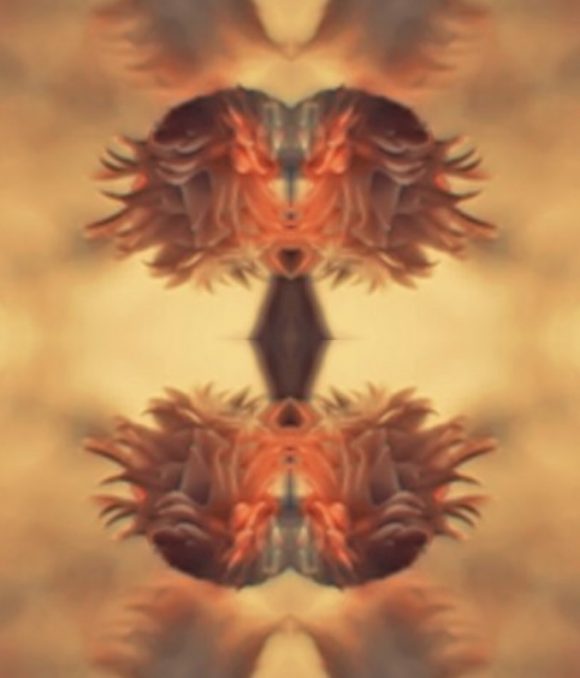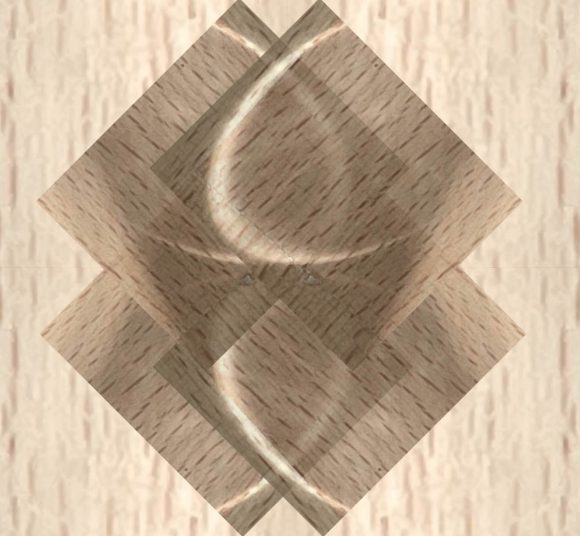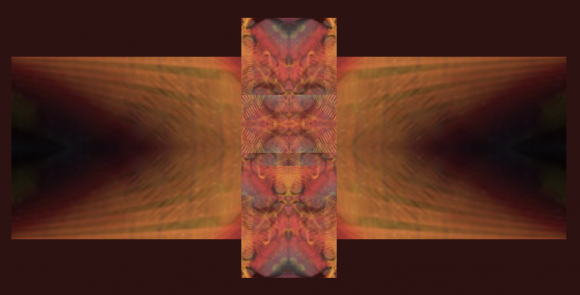There is a certain kind of personal gain which you can only attain by deliberately becoming invisible to others — by ensuring that they can no longer see you for what you really are. If this sounds like a small price to pay, wait to see what develops out of it: for there are hidden costs to the bargain. It is, after all, a pact with dark forces, and in the end, it may leave you in despair.
How do we know that dark forces are involved in tradeoffs like this? For one thing, we might arrive there by simple common sense (if it sounds too good to be true, it probably is). For another, though more speculatively, we might have guessed purely from the symbolism: what else could it mean if clarity of vision and the light of seeing has to be relinquished? To put it bluntly: if — on the symbolic level — something wants to lead you away from the light, it will probably turn out to stand in for a dark drive. Finally, however, we also should know because stories have warned us about this, and demonstrated it to us, for ages.
1. In an old Jewish tale, a poor innkeeper whose house is not running well encounters, one day in his storeroom, a beautiful woman who claims to be the queen of Sheeba. She promises him a bag of money if he makes love to her, on condition that he would tell no-one about it. The deal is done, consumed, and paid up; and then it all repeats the next day, and the day after, and so on. The innkeeper grows rich, and he sticks to his word and remains silent about his hidden source of wealth. In particular, he does not tell his wife (the only other character in the story).
This whole thing (retold in “The Queen of Sheba”; Howard Schwartz, Lilith’s Cave, 22-24) can be understood as a trade not unlike the one I have just outlined in abstract terms: as long as the source of his personal gain is hidden, the innkeeper can expect it to continue to flow, and the whole affair is very pleasant at that. The price he pays, however, is intransparency: a betrayal of trust, at the very least a false display, a mask. He hides something — he has to make sure that others can no longer really see him for what he really is.
As the story runs its course, the wife inevitably grows suspicious and finds out, at which point it all breaks down and ends in ruins. All the money disappears, the purchases vanish, and they’re all reverted back to their original poverty; and “it was much more terrible this time” (24). The innkeeper, finally, understands that he has had dealings with a demoness.

2. I have not yet looked up whether we know the sources Hoffmann used for his Abenteuer in der Silvesternacht, and whether perhaps this tale — in one of its versions — might have among them (which is not too unlikely). Either way, we can recognize many of the same elements: there is a married protagonist, Erasmus Spikher, who ends up making a deal with a demon; as a result, his wife (and child) can no longer see him for what he is. This, in Hoffmann’s version, is of course rendered by a very specific symbolism: the loss of his mirror image.
As in the older tale, the demon first appears as a beautiful woman for whom the protagonist falls, and who then takes away his visibility (i.e. in Hoffmann: his reflection in the mirror). The demonic forces are more differentiated, however: for the Giuletta figure is only one aspect of the evil demon; the other is the appalling “Ciarlatano” Dapertutto (140), who appears in some not entirely clear way connected to her. Together, they play an extortion game with Spikher: they seduce him into a blindly passionate state in which he commits a murder, then take his mirror image and at the same time help him escape — while implying that, if he still had his mirror image, a manipulation of it might practically remove the consequences of the crime.
The deal, then, is much more complicated in this story, and it is worth taking a closer look at its terms.
3. First, what is the benefit for the protagonist? The innkeeper receives wealth (and sexual pleasure), and on a pretty secure and regular basis. In the end, all this turns out to have been an empty illusion, of course. All the money, jewelry, social status etc. vanish again. Although it is a bit of a simplification, let us say that the innkeeper gets material, economic, and social success out of his deal.
With Spikher, things are considerably more complex. Even at the beginning of the story, he is ambivalent about his marriage, which he values and honors, but then also gladly abandons when he falls for Giulietta. He is also somewhat unclear about his priorities between his married life and his lifestyle: after all, he leaves his home for the warm climate and pleasant surroundings of Italy (135), and surely that expresses a preference, too. His morality looks narrowly self-interested and fear-driven as well, for when he realizes that he has killed a man in his impassioned rage, his impulses drive him to escape and hide rather than to face responsibility for his deeds. Consequently, what he gets out of the deal with the demon is protection, a kind of exemption from justice, and a return to his married life (a respectable social facade) instead of facing criminal prosecution. To various degrees, therefore, the benefit for Spikher from his deal is that he is allowed to act out evil tendencies with impunity — a warp into a reality where “crime pays”. Thus on the benefits side, his deal is at once more nuanced and more darkly potent than that of the innkeeper.
It is also more soul-eroding, as will become apparent when we now look at the cost side. At first, the demon of course designs the cost to appear as a small price to pay: the innkeeper merely has to keep silent, and Spikher loses his mirror image. True, this appears horrible to him initially (142), and the point is hammered home by Dapertutto, who offers him impunity for “just a little manipulation of his mirror image” (143) — which of course Spikher just has lost. But soon he gets to think little of the loss: he makes it back home, and “bald schien es ihm, als sei in ruhiger, friedlicher Häuslichkeit der Verlust des Spiegelbildes wohl zu verschmerzen.” (144)
Initially, then, the balance looks not too bad for both protagonists: that is, as long as we consider only the overt costs. But there are hidden costs, and these have a habit of more and more creeping up on you, until they suddenly lash out and bring you down.
4. In the case of the innkeeper, the hidden cost is incurred when he relinquishes his honesty: the demonic deal requires him to keep a secret from his wife, who first gets bored, then grows suspicious and eventually begins to investigate. The innkeeper’s wife represents the human community, and his relations with them; and for this community, the innkeeper becomes intransparent and inauthentic. The consequences emerge after a while, until it finally becomes clear that the accumulated costs outweigh the benefits by far. What looked like a good deal in the short term has destroyed real value in the long term.
Erasmus also becomes a social outcast. Something like this already suggests itself in the night of his escape: he tells his friend Friedrich everything about his misadventure — but leaves out the loss of his mirror image (143). On this travels, he then stays at an inn where the patrons become aware of his lack of reflection, throw him out and make sure that “ihm von Polizei wegen angekündigt wurde, daß er binnen einer Stunde mit seinem vollständigen, völlig ähnlichen Spiegelbilde vor der Obrigkeit erscheinen oder die Stadt verlassen müsse” (144), an episode that lets him feel the loss of his reflection “very peculiarly” (143). (It’s also a wonderful portrait of stubborn olden-German respect of authority, just to quickly remind us in passing of Hoffmann’s highly developed command of the voice of irony.)
But things get darker soon. Once his wife realizes that he is without reflection, she leaves him. At this point, Dapertutto and Giulietta reappear and try to manipulate him into murdering his family. This fails, but it is a chilling demonstration of how severely Spikher’s options are restricted. He is trapped in a devilish dilemma: following through on his passion for Giulietta (which is really a demonically induced madness) would lead further down the road to crime, murder and betrayal — that’s what it really means that Giulietta wants not only his mirror image, but Erasmus’ “real person” (145, 147); but there is no turning back either, for he has already forfeited his mirror image (he has committed one crime already), and of course Giulietta refuses to give it back to him (there is no way to revert a murder). Erasmus has gone half the way to hell, and now he is suspended in this half-way state, resisting the pull further down, but also incapable of pulling himself back up. He is destined to keep wandering in this liminal state. (On which wanderings, we remember, we have encountered him in the frame story.)
Now that we have a clearer understanding of the terms of the demonic trade, what is the function of mirror symbolism in all of that?
5. We can go back to a formulation I already brought up earlier: mirrors show us something about ourselves, and they show it to us in the way others would see it. From this, we can work our way backwards: not having a mirror image, then, would be tantamount to there being no way in which others can see this any more. We have, in a sense, become intransparent, inscrutable, inacessible to others (though not to ourselves). Thus when Erasmus Spikher loses his mirror image, this means that others cannot see his soul any more (whereas he still knows about it — including the dark portions).
The story connects loss of soul with erotic desire, intense passion, demonic possession, and violent crime — thus alluding to archaic notions of the “perils of the soul”, where the unconscious takes over, typically in a drop of the mental niveau.
Die urtümlichen “Gefahren der Seele” bestehen hauptsächlich in den Gefährdungen des Bewußtseins. Faszination, Behexung, Seelenverlust, Besessenheit usw. sind offensichtlich Phänomene der Dissoziation und der Unterdrückung des Bewußtseins durch unbewußte Inhalte.
[GW IX/I, §501]
Thus a psychological reading in the Jungian vein would associate the socially acceptable life-plan of Erasmus and the interactions with his family, his friend, and the various townspeople with conscious life and the demonic forces — personalized in Giulietta and Dapertutto — with unconscious complexes. Losing one’s mirror image, according to such an interpretation, would probably amount to relinquishing conscious control to some extent (but not fully). In particular, it would symbolize an intransparency the subject has towards themselves, a kind of blind spot, an inability of self-awareness. This kind of opacity of a subject to their own conscious perceptions is of course a staple of analytical psychology, and it has often been noted that romantic storytellers (particularly Hoffmann) were among its main literary precursors in these matters. And interpretations of this sort are compelling up to a point. But I don’t want to follow this particular interpretational route; for I think there is a more interesting, and less well-trodden path.
6. For one thing, the psychological interpretation I just alluded to would leave half of what the mirror symbolism shows us on the table.
If the social environment of the protagonist (family, friend, people around him) roughly represent, on the symbolic level, the subject’s conscious life, then the missing mirror image means that such conscious life no longer includes a transparent and authoritative self-knowledge, at least some of the time. The world, so to speak, no longer “sees the soul” of the subject, when it cannot see the protagonist’s mirror image any more. But then again, the social world is still, in the words of Hoffmann’s demon, “in possession” of the protagonist’s actual self (“sie [hat] euch leiblich”, 143). The dark forces, on the other hand, would like to devour that self — that’s what they are really after —; they regard having the mirror image only as a first step, a first induction. The mirror image appears here, not as the more important possession, but as the less important possession, compared to the “real person” of the protagonist. It’s the latter which the demons want to control. (But the social world seems less concerned with it, and actually pays much more attention to the mirror image.)
Even more curiously, what is the relation between what the world can see (in the story) and what the protagonist knows? I said that Erasmus, having lost his mirror image, can no longer be seen by others for who he is — but in the story, he still knows that himself. (He has, in other words, a complete awareness of his own failings and, indeed, crimes, all along.) Since the mirror represents us in the way others can see us, loss of mirror image symbolizes losing a way of how others can see the subject, but then again, it seems to symbolize at the same time that the subject can still see themselves in a way, not as others see them, but as they see themselves.
7. Notice that this is a dimension that really only comes into play with the mirror symbolism. We can see this if we compare Hoffmann’s subtle and complex version of the tale with the Jewish story of the innkeeper and the “Queen of Sheba”.
Although it has the same basic structure and dynamic between the social world and the demonic forces, the stage of the narrative in which (in Hoffmann’s story) the mirror image comes in presents (in the Jewish tale) merely an unfair distribution of knowledge and awareness: the man has secrets, and the wife is kept in the dark (a state of self-blindness in the subject due to demonic possession). But in Hoffmann’s version, the social world does know: everybody notices the lack of reflection, Erasmus’ missing mirror image, and makes life difficult for him because of it. By introducing the mirror image as a symbol, Hoffmann has given the social world of the protagonist (which symbolizes the subject’s conscious life) something to be suspicious about. There is no counterpart to that in the Jewish story. In Hoffmann’s story, there is a palpable nothingness where there should be something, namely a mirror image; and that something would have been a view of the subject’s soul. The mirror symbolism has taught us (the audience) that there is something like a view of a subject’s soul in the first place, and that demonic possession would result in an occluded view there.
So far, this seems to resonate with the psychological interpretation. But as I have pointed out (in §6 above), the world of the protagonist treats the mirror image (i.e., the view of the subject’s soul) as primary, whereas it discounts “having” the real person, treating it as secondary — while the demons, conversely, actually want the “real person” (“mit Leib, Leben und Seele”, 145), and take the mirror image merely as down payment.
But that’s the wrong way round. The demons (the unconscious drives) should primarily be interested in the mirror image, i.e. access to the soul’s reflection — for the unconscious has the characteristic of striving to become conscious. Why would they care for the “real person” at all? (cf. GW VII, §345.)
8. The more we go into careful analysis, the more the psychological interpretation appears insufficient. We can do better, and arrive at an interpretational route that covers all of the mirror symbolism: the parts of it which the psychological interpretation accounts for, but also both its peculiar high priority for the social world and secondary value for the demons, and the relevant connection to what the subject themselves knows. (Such an interpretation should also show how Hoffmann’s mirror symbolism goes farther than that in Wilde’s or Gaiman’s versions, which I think the psychological interpretation can fully penetrate.)




[…] which narrates the loss of mirror image), some emphasis is put on the social consequences: Spikher becomes a social outcast, and Hoffmann drives the point home by demonstrating it through various episodes in the text. What […]